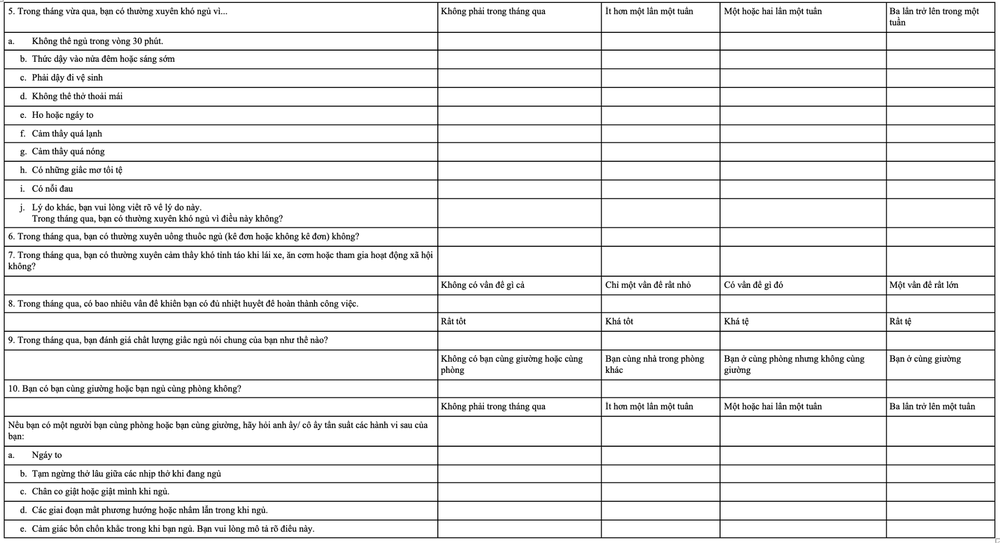This is an automatically translated article.
Quality sleep is important to overall health. However, assessing sleep quality is much more difficult than testing sleep duration. Scientists have used the Pittsburgh Sleep Quality Index (PSQI) to measure sleep quality in both clinical and research studies.The PSQI is a series of questions about sleep-related behaviors and is used in both clinical and research settings. Patients provided self-assessment responses to questions in seven categories, including sleep quality, sleep disturbance, and daytime dysfunction. Experts assess answers to questions and determine next steps in improving patients' sleep quality.
1. Pittsburgh Sleep Quality Scale (PSQI)
The following questions relate only to your normal sleep habits within the past month. Your answer will indicate the most accurate answer for most of the day and night for the past month. Please answer all questions.During the past month, what time do you usually go to bed? During the past month, how long (in minutes) did it usually take you to fall asleep each night? During the past month, what time did you usually wake up in the morning? In the past month, how many hours did you sleep at night? (This may be different from the number of hours you've been in bed.).

Thang đánh giá chất lượng giấc ngủ Pittsburgh (PSQI)
2. How to Score Pittsburgh Sleep Quality Index (PSQI)
In the PSQI scorecard, the first 9 questions are equivalent to 19 self-assessments, and 10 with 5 items are assessed by roommates or bedmates. Only self-assessment questions are scored, the 19 scoring sections are scored from 0 to 3 points. In all cases, a score of “0” indicates no difficulty, while a score of “3” indicates severe difficulty.Then, seven component points are added to yield a “full” score, with a range of 0 -21 points, “0” indicating no difficulty and “21” indicating severe difficulty. in all fields.
Component 1: Subjective sleep quality - question number 9. Scoring for question number 9:
Very good: 0 score Fairly good: 1 point Fairly bad: 2 points Very bad: 3 points Component score 1 :.......
Component 2: Sleep delay - question number 2 and question 5a. Scoring for question
2:
< 15 minutes: 0 points 16-30 minutes: 1 point 31 - 60 minutes: 2 points > 60 minutes: 3 points Scoring for question 5a:
Not in the last month: 0 score Less than once a week: 1 point Once or twice a week: 2 points Three or more times a week: 3 points Sub-score 2 is based on the sum of the scores on the 2 questions above:
0 : 0 points 1-2: 1 point 3-4: 2 points 5-6: 3 points Component 3: Sleep duration - question number 4. Score for question number 4 and component 3:
> 7 hours: 0 points 6-7 hours: 1 point 5 - 6 hours: 2 points < 5 hours: 3 points Component score 3:.....
Component 4: Sleep efficiency - questions No. 1, No. 3 and No. 4. Sleep Efficiency = (hours of sleep/hours in bed) x 100%
Hours of sleep: question 4
Hours in bed: calculated from answers to questions
1 and
3.
Sleep efficiency score for component 4 :
> 85%: 0 points 75 - 84%: 1 point 65 - 74%: 2 points < 65%: 3 points Component 5: Sleep disorders - questions 5b - 5j. Questions 5b - 5j are scored as follows:
Not in the previous month: 0 points Less than once a week: 1 point Once or twice a week: 2 points Three or more times a week: 3 points Total From questions 5b - 5j will calculate the score for component 5 as follows:
0: 0 points 1 - 9 1 point 10 - 18: 2 points 18 - 27: 3 points Component 6: Using sleeping pills - question number 6. The scoring for question 6 and component 6 is as follows:
Not in the previous month: 0 points Less than once a week: 1 point Once or twice a week: 2 points Three or more times a week: 3 points Component 7: Daytime dysfunction - questions 7 and 8. Scoring for question number 7 is as follows:
Not in the last month: 0 points Less than once a week: 1 point One or twice a week: 2 points Three or more times a week: 3 points The scoring for question number 8 is as follows:
No problem at all: 0 points Only a very minor problem: 1 point Problem something: 2 points A very big problem: 3 points The total score of questions 7 and 8 will calculate the component score 7 as follows:
0: 0 points 1 - 2: 1 point 3 - 4: 2 points 5 - 6: 3 points Global PSQI score: sum of seven component scores:.......

Thang đánh giá chất lượng giấc ngủ pittsburgh nhằm đánh giá chất lượng giấc ngủ
With modern medical equipment and a team of leading experts who are lecturers of psychiatry at Hanoi Medical University, the Psychology clinic - Vinmec Times City International General Hospital is capable of developing conduct psychological tests, specialized psychotherapy for medical examination and treatment.
With enthusiasm and love for the profession, the medical team and doctors working at the clinic will bring customers the best services with the highest service quality.
Psychology Clinic is currently cooperating with leading professors and experts of Hanoi Medical University, frontline hospitals in the country and internationally to diagnose and treat in order to bring effective medical examination and treatment. best treatment for the patient.
Please dial HOTLINE for more information or register for an appointment HERE. Download MyVinmec app to make appointments faster and to manage your bookings easily.
References: opapc.com, goodmedicine.org.uk, sleepfoundation.org












